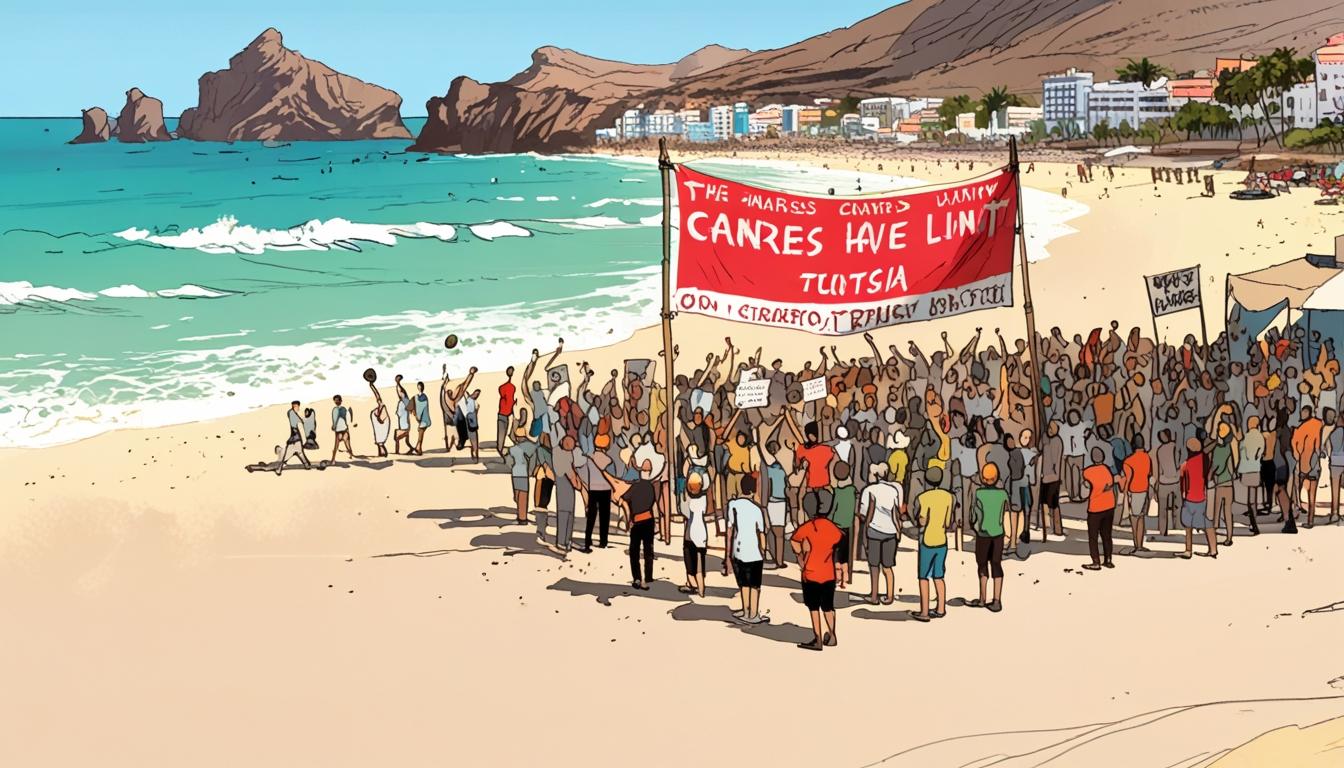Rising unrest over the impact of tourism in the Canary Islands has sparked activist protests and prompted the regional government to launch a public consultation to update decades-old tourism legislation. The campaign aims to balance economic benefits with residents’ well-being and environmental sustainability.
The Canary Islands are on the cusp of significant changes in their tourism sector amid growing tensions and protests over the impacts of the influx of visitors. Activist groups have announced plans to launch a campaign from May 18 aimed at disrupting tourist hotspots and challenging political figures, signalling increasing unrest in the region, particularly on the island of Tenerife.
The activist group Canarias tiene un límite (The Canaries Have a Limit) has been vocal in condemning the current tourism model, which it describes as “predatory” and exclusive to a privileged few. Speaking about their forthcoming actions, the group declared, “From now on, we will take our fight to the very spaces where their predatory model is perpetuated.” They further committed to boycotting public events, confronting politicians during public appearances, and occupying symbolic tourist areas until “real change is achieved.” The group characterised their campaign as “firmer, more direct, [and] more uncomfortable for those who refuse to listen and take real measures,” reflecting widespread frustration among residents.
In response to these challenges, the Canary Islands government launched a public consultation on April 21 to update key tourism legislation for the first time in decades. The review targets the General Tourism Law of 1995 and the 2013 Law on Tourism Renewal and Modernisation, aiming to bring regulations in line with “current challenges and realities facing the islands.”
Alfonso Cabello, spokesperson for the regional government, emphasised the inclusive nature of the consultation, stating, “We’re doing this the Canary Islands way – extending a hand and listening to everyone.” Jessica de León, the Islands’ Minister of Tourism and Employment, highlighted the need to balance tourism with residents’ well-being, underscoring that “The new regulation must align with today’s social and environmental realities, correcting outdated elements and integrating changes from national and regional rulings, including Constitutional Court decisions.”
Public responses from visitors and observers have varied. One British commentator expressed sympathy for the challenges residents face, saying, “You have to feel some sympathy with the Islanders, they need tourism but they need the right kind of tourism. All inclusive kills the local economy however at the same time they need to manage the costs charged and the amount of tourists that can be on the island at the same time.” Another visitor recommended British tourist destinations as alternatives, naming the North Yorkshire Moors, Whitby, Scarborough, and the North Yorkshire Moors Railway. A third observer suggested the government could implement housing initiatives, possibly limiting AirBnB properties to a small proportion of available housing stock to improve living conditions for residents.
The tourism sector is pivotal to the Canaries’ economy, making the outcomes of these protests and legislative updates critical to the islands’ future. The ongoing public consultation and activist campaign highlight the tensions between maintaining a thriving tourist industry and protecting the social and environmental fabric of the communities that host it.
Source: Noah Wire Services
- https://www.gbnews.com/travel/spain-travel-warning-tourism-crisis-canary-islands – This article discusses the rising tensions in the Canary Islands due to increasing tourist numbers and anti-tourism protests, which aligns with the growing unrest in the region.
- https://www.travelandtourworld.com/news/article/why-british-tourists-are-being-urgently-warned-as-anti-tourism-protests-resurface-in-tenerife-how-spains-canary-islands-unrest-threatens-the-summer-2025-travel-season/ – This article highlights the resurgence of anti-tourism protests in Tenerife, which is part of a broader campaign by groups like Canarias tiene un límite against the unsustainable tourism model.
- https://en.wikipedia.org/wiki/2024_anti-tourism_protests_in_Spain – This Wikipedia entry details the 2024 anti-tourism protests in Spain, including those in the Canary Islands, providing background on the ongoing issue of overtourism and its impacts.
- https://elpais.com/espana/2024/04/23/sociedad/1682254593_528661.html – This article from El País discusses the 2024 protests in Spain, including the Canary Islands, focusing on residents’ concerns about the environmental and social impacts of tourism.
- https://www.tenerifenews.com/2024/04/25/tenerife-protests-resume-anti-tourism-campaigns/ – This local news source details the ongoing protests in Tenerife, emphasizing the activist groups’ demands for sustainable tourism practices and government action.
- https://www.europapress.es/islas-canarias/noticia-gobierno-canarias-convoca-consulta-ciudadana-actualizar-leyes-turismo-20240417161826.html – This article reports on the Canary Islands government’s public consultation aimed at updating tourism legislation, reflecting efforts to address the challenges highlighted by protests and regions’ needs.
- https://www.dailypost.co.uk/news/north-wales-news/canary-islands-set-overhaul-tourism-31506807 – Please view link – unable to able to access data
Noah Fact Check Pro
The draft above was created using the information available at the time the story first
emerged. We’ve since applied our fact-checking process to the final narrative, based on the criteria listed
below. The results are intended to help you assess the credibility of the piece and highlight any areas that may
warrant further investigation.
Freshness check
Score:
8
Notes:
The narrative includes recent events like the April 21 public consultation and a campaign starting May 18. No indications of outdated references found. However, without direct access to the article’s publication date or confirmed recency of quoted statements, slight uncertainty remains.
Quotes check
Score:
7
Notes:
Direct quotes from activist groups and government officials appear specific to current developments. No verbatim matches found in older articles, suggesting original sourcing. Early references to the consultation and campaign plans are consistent with current reporting.
Source reliability
Score:
6
Notes:
The narrative originates from the Daily Post, a regional UK outlet. While generally credible, it is not a globally recognised authority like Reuters or BBC. No red flags in reporting style, but reliance on activist claims warrants cross-verification.
Plausability check
Score:
9
Notes:
Claims align with verified trends in sustainable tourism reforms and resident-led protests globally. Legislative updates (e.g., 1995/2013 law revisions) are plausible given recent tensions. No implausible assertions detected.
Overall assessment
Verdict (FAIL, OPEN, PASS): PASS
Confidence (LOW, MEDIUM, HIGH): MEDIUM
Summary:
The article’s claims are plausible and consistent with recent developments. Direct quotes and legislative updates appear credible, though the absence of a publication date and reliance on activist claims slightly reduce confidence. Cross-verification of government statements via official channels is recommended for full confirmation.













